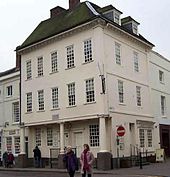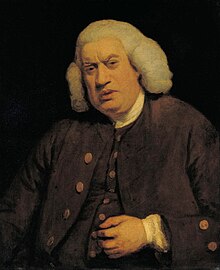Samuel Johnson
Samuel Johnson (7 September July / 18 September 1709 greg. In Lichfield , † 13 December 1784 in London ) was an English scholar, lexicographer , writer , poet and critic .
After William Shakespeare, he is the most cited English author and in the 18th century was the most important person in literary life in England , comparable to Johann Christoph Gottsched in Germany . He was mostly named Dr. Johnson called. Trinity College Dublin made him an honorary doctorate in law in 1765, and ten years later he received another honorary doctorate from Oxford University.
life and work
Samuel Johnson was born on September 18, 1709 in Lichfield, Staffordshire . Here he attended the Lichfield Grammar School (now King Edward VI School ) with Robert James, who later became a doctor , and both remained friends throughout their lives. On his three-volume dictionary A medicinal dictionary, including physic, surgery, anatomy, chimistry and botany (1743–1745), he contributed with his own articles.

He studied at Pembroke College at Oxford , but was forced for financial reasons to accept the position of a tutor at a free school in Leicestershire before the end of his studies . He soon gave up this position to earn a living as a translator and writer. He translated the French translation of Joachim le Grand 's trip to Abyssinia by the Portuguese Jesuit Jerónimo Lobos ( Relation historique d'Abbisinie d 'R. P. Jerôme Lobo, etc. ) into English, for which he received five guineas.
Johnson lived with his friend Harry Porter, who suffered from an incurable disease. When Harry Porter died on September 3, 1734, he left behind his 45-year-old wife Elizabeth Jervis Porter ("Tetty") and three children. Samuel Johnson married the widow, 21 years his senior, on July 9, 1735 in St. Werburgh Church in Derby . Elizabeth Porter brought £ 800 into the marriage. Her family did not approve of the marriage and her son broke off all contact with her in protest. The couple founded a pupil school in Birmingham . When this venture failed, Johnson went to London in 1737 with his student, the later famous actor David Garrick , to perform his rhymed tragedy Irene , but it failed. He published parliamentary reports for Gentleman's Magazine . He became known through several poems, e.g. B. the satire London (1738), an imitation of the third satire of Juvenal , in which he castigated the vices and follies of the British capital with wit and irony. This was followed by The Debates of the Senate on Liliput , commenting on excerpts from the speeches of the most famous members of parliament of the time, and in 1744 a biography of his friend, the poet Richard Savage .
Between 1747 and 1755 Johnson worked out the Dictionary of the English Language (1755, 2 volumes), which appeared in its 6th edition in 1758 and has influenced all similar lexicons of the English language to this day . Noah Webster compared Johnson's performance in lexicography to Isaac Newton's in mathematics. Four features set the dictionary apart from its English predecessors:
- It was designed to take stock of the entire vocabulary - in clear contrast to the previously common haphazard lists of “difficult words”.
- It was based on a corpus of applied examples, with certain vocabulary groups excluded in advance (e.g. proper names).
- It had a literary dimension, reproduced the language of the best English authors ( William Shakespeare , John Milton , Francis Bacon ) and thus deviated from the previously predominant coverage of purely factual language.
- It earned respect for the everyday object dictionary , so that Johnson's dictionaries are still used for normative purposes and serve as a guide to good style (even if the normative character of the dictionaries has been put into perspective by modern linguistics ).
During or after work on the dictionary, Johnson also published the magazines The Rambler (1750-1752) and The Idler (1758-1760). In 1759 his politically instructive novel History of Rasselas, Prince of Abyssinia was published .
In 1762, a government-granted pension of £ 300 released him from acute financial needs, for which he thanked him with two pamphlets of political content - The False Alarm (1770) and Taxation No Tyranny (1775). His Shakespeare edition (1765, 8 volumes), which became epoch-making in literary history, also fell during this period. Although Johnson's characteristics of Shakespeare's drama betray the prevailing French influence at the time, especially the view shared by Denis Diderot of the moralizing tendency of bourgeois drama (" stirring piece "), on the other hand, his Shakespearean view breaks through the critical views of the age that were customary to date. While Johnson sees high “art” represented in ancient writers, he sees Shakespeare, like John Milton , the poet of “nature”. Johnson was the first in England to not condemn Shakespeare for mixing the tragic with the comic or for neglecting the "unity of time and place."
The literary fruit of a trip to Scotland and the Hebrides in 1773 was his Journey to the Western Isles of Scotland (1775), which embroiled him in a violent feud with James Macpherson because of the doubts it expressed about the authenticity of Ossian's poetry . At the age of 70 Johnson wrote the biographies of English poets ( The Lives of the Most Eminent English Poets , 1779–1781) for a collection of the English classics. He died on December 13, 1784 and was buried in Westminster Abbey in London .
Johnson sponsored Oliver Goldsmith , whom he freed from school arrest by selling the manuscript for his novel The Vicar of Wakefield . Johnson also sponsored a number of women writers who were part of his literary circle, with Charlotte Lennox singling out over Elizabeth Carter, Hannah More and Frances Burney .
Johnson founded two of Britain's most prestigious clubs , the Literary Club (1764) and the Evening Club (1783).
List of works (selection)
- Rambler . London Printed for J. Payne and J. Bouquet in Pater-noster-row 1751 [-1752], 1752. 2 volumes. First edition, first issue.
- A Dictionary of the English Language. First edition. Printed for W. Strahan and T. Cadell in the Strand, London 1755.
-
Prince of Abissinia. A Tale (Rasselas). Two volumes, first edition, London Printed for R. and J. Dodsley and W. Johnston 1759. From 1790 as Rasselas; Prince of Abissinia. A valley. Two volumes, Johnstone, W. Taylor, and J. Davies, London 1790. German as:
- The story of Rasselas the Prince of Abyssinia and his research into happiness and the best occupation in life. A Moral Tale for the Mature Youth and Everyone by Samuel Johnson . From the English by S. Gätschenberger. Stahel, Würzburg 1874. New edition:
- The story of Rassela's Prince of Abyssinia. An oriental story. Translation by Joachim Uhlmann, Insel Verlag, Frankfurt 1964.
-
Journey to the Western Isles of Scotland. Printed for W. Strahan and T. Cadell in the Strand, London, 1775. German as:
- Samuel Johnson's trips to the Western Isles of Scotland. Anonymous translation into German, Leipzig in the Weygandschen Buchhandlung 1775. New edition, ed. Volker Wolf u. Bernd Zabel, Insel Verlag, Frankfurt 1982, ISBN 3-458-32363-5 .
reception


Johnson's life and views were meticulously recorded by one of his admirers, James Boswell , and published as The Life of Johnson ( 1791 ) after his death .
Another important biographical source are the letters, anecdotes and diaries of Hester Thrale , in whose salon Johnson frequented and whose family he was close friends.
Johnson's cat Hodge was known through a passage in Boswell's Life of Samuel Johnson and later mentioned in works by Vladimir Nabokov and Percival Stockdale (1736-1811).
In youth book trilogy Stone Heart by Charlie Fletcher play both "Dictionary Johnson" and his cat Hodge not unimportant roles. Johnson's statue - the original is on the back of St Clement Danes' Church in London - comes to life in it, gives the main characters important information and supports them in their tasks. Fletcher uses Johnson's eloquence and humor to make the character appear authentic.
Johnson's quote "He who makes a beast of himself gets rid of the pain of being a man" ("He who makes himself an animal frees himself from the suffering of being human") is Hunter S. Thompson's novel Fear and Loathing in Las Vegas as the motto . It is also used in the opening credits of the film adaptation of the same name , at the beginning of the song Bat Country by Avenged Sevenfold (A7X) and in the intro to the computer game Amnesia: A Machine for Pigs .
A painting showing Johnson reading became an internet meme in March 2012 , often in conjunction with the caption “Dafuq did I just read?” (like "What on earth did I just read?").
literature
- Julien Green : Samuel Johnson (1709-1784). In: ders .: English suite: literary portraits. Translated from the French by Helmut Kossodo . List, Munich 1989, ISBN 3-471-77653-2 , pp. 5-32.
- James Boswell : Dr. Samuel Johnson: Life and Opinions. With the diary of a trip to the Hebrides. Ed. And from the English by Fritz Güttinger . Diogenes, Zurich 2008, ISBN 978-3-257-06673-9 .
- Henry Hitchings: The world in thirty-eight chapters or Dr Johnson's guide to life . Macmillan, London [2018], ISBN 978-1-5098-4192-9
- Johnson, Samuel . In: Encyclopædia Britannica . 11th edition. tape 15 : Italy - Kyshtym . London 1911, p. 463 (English, full text [ Wikisource ]).
Web links
- Literature by and about Samuel Johnson in the catalog of the German National Library
- Works by and about Samuel Johnson in the German Digital Library
- Samuel Johnson . BBC (English)
- Samuel Johnson . In: Website of Dr. Johnson's House (English)
Individual evidence
- ^ OM Brack Jr., Thomas Kaminski: Johnson, James, and the Medicinal Dictionary. In: Modern Philology , Volume 81, 1984, pp. 378-400.
- ↑ Walter Jackson Bate: Samuel Johnson. Harcourt Brace Jovanovich, New York 1977, ISBN 0-15-179260-7 .
- ↑ What The Fuck Am I Reading? In: Know Your Meme . Retrieved September 17, 2016.
| personal data | |
|---|---|
| SURNAME | Johnson, Samuel |
| ALTERNATIVE NAMES | Dr. Johnson (nickname) |
| BRIEF DESCRIPTION | English scholar, writer, poet, critic and lexicographer |
| DATE OF BIRTH | September 18, 1709 |
| PLACE OF BIRTH | Lichfield , Staffordshire, England |
| DATE OF DEATH | December 13, 1784 |
| Place of death | London |


